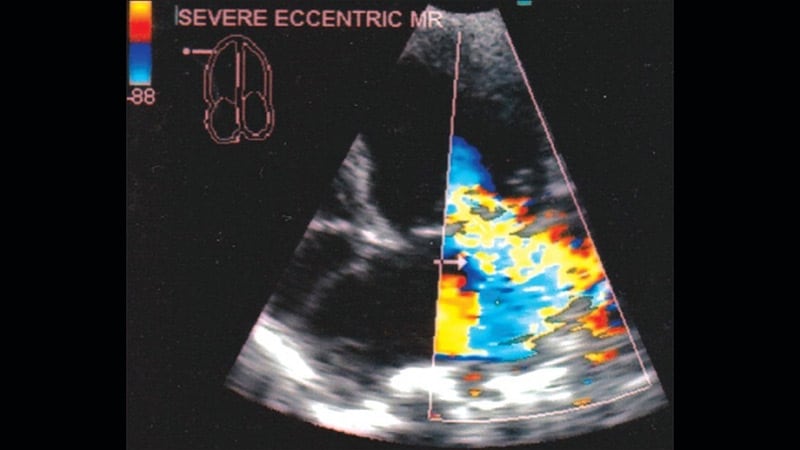Transapical Valve Replacement for Mitral Regurgitation
Core Concepts
Transapical valve replacement effectively treats mitral regurgitation.
Abstract
The content discusses the successful use of the Tendyne transcatheter mitral valve replacement (TMVR) for patients with severe symptomatic mitral regurgitation (MR) and severe mitral annular calcification (MAC). The procedure showed excellent procedural success, relief of MR, and improvements in cardiac hemodynamics and quality of life. The Tendyne TMVR device design, patient outcomes, and trial results are detailed, highlighting the positive impact on patients' health and quality of life.
Key Highlights:
- Tendyne TMVR insertion through the cardiac apex
- Excellent procedural success and relief of MR
- Improvements in hemodynamics, functional status, and quality of life
- Trial results from 70 centers with 100 roll-in patients
- Survival rates and effectiveness of the Tendyne valve
- Impact on cardiac function and quality of life
- Outcomes for patients with severe MAC
- Hemodynamic improvements and quality of life scores
- Challenges and considerations for the procedure
Customize Summary
Rewrite with AI
Generate Citations
Translate Source
To Another Language
Generate MindMap
from source content
Visit Source
www.medscape.com
Transapical Valve Replacement Relieves Mitral Regurgitation
Stats
"The survival was 74% at 12 months. The valve was very effective at eliminating much regurgitation, and 96.5% of patients had either zero or 1+ at a year, and 97% at 30 days had no mitral regurgitation."
"Cumulative adverse outcomes at 1 year were 27% all-cause mortality, 21.6% cardiovascular mortality, 5.4% all-cause stroke, 2.3% myocardial infarction (MI), 2.2% post-operative mitral reintervention, no major but 2.3% minor device thrombosis, and 32.4% major bleeding."
Quotes
"For this new procedure, with new operators, there was no intraprocedural mortality, and procedural survival was 100%." - Jason Rogers, MD
"There was a consistent and steady improvement in KCCQ [Kansas City Cardiomyopathy Questionnaire] score, as expected, as patients recovered from this invasive procedure." - Jason Rogers, MD
Key Insights Distilled From
by Daniel M. Ke... at www.medscape.com 11-30-2023
https://www.medscape.com/viewarticle/998930
Deeper Inquiries
How does the Tendyne TMVR procedure compare to traditional surgical options for mitral regurgitation?
The Tendyne transcatheter mitral valve replacement (TMVR) procedure offers a less invasive alternative to traditional surgical options for mitral regurgitation. Unlike open-heart surgery, which involves sternotomy and cardiopulmonary bypass, the Tendyne TMVR is placed through the cardiac apex, reducing the need for extensive incisions and bypass support. This approach results in a quicker recovery time, shorter hospital stay, and potentially lower risk of complications associated with traditional surgery. Additionally, the Tendyne TMVR procedure can be performed on high-risk surgical patients who may not be suitable candidates for open-heart surgery, expanding the treatment options available for mitral regurgitation.
Is the high rate of major bleeding a significant concern for the long-term viability of the Tendyne TMVR procedure?
The high rate of major bleeding observed in the Tendyne TMVR procedure, as reported in the SUMMIT trial, is a significant concern for the long-term viability of the procedure. While the procedural survival and technical success rates were high, the incidence of major bleeding events, especially peri-procedurally or within the first month, raises red flags regarding the safety and feasibility of the Tendyne TMVR procedure. Major bleeding can lead to increased morbidity, prolonged hospitalization, and potentially impact long-term outcomes for patients undergoing the procedure. Addressing and mitigating the risk of major bleeding is crucial for ensuring the safety and effectiveness of the Tendyne TMVR procedure in the future.
How can advancements in transcatheter devices impact the future of mitral valve replacement procedures?
Advancements in transcatheter devices, such as the Tendyne TMVR, have the potential to revolutionize the field of mitral valve replacement procedures. These devices offer less invasive alternatives to traditional surgical options, allowing for the treatment of high-risk patients who may not be suitable candidates for open-heart surgery. By improving procedural success rates, reducing complications, and enhancing patient outcomes, transcatheter devices can expand the accessibility of mitral valve replacement procedures to a broader population of patients. Additionally, ongoing advancements in device design, delivery systems, and operator experience can further refine the safety and efficacy of transcatheter mitral valve replacement procedures, paving the way for more widespread adoption and improved patient care in the future.
0
